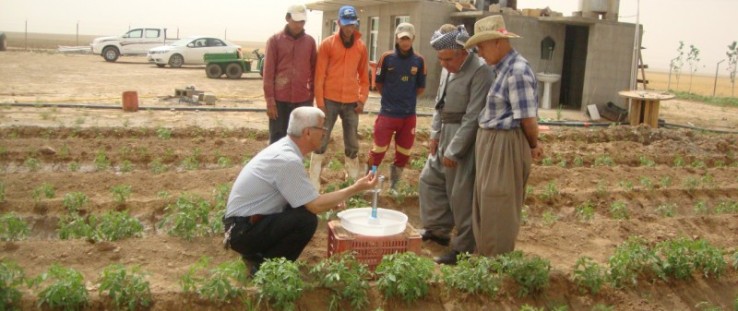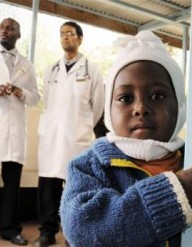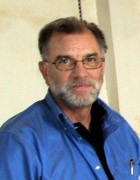

FrontLines: What is the one thing you wish someone had told you, and that you can now share with newbies, before moving to the country in which you currently serve?
Michael Maxey: I would tell anyone who plans to serve in a conflict area that you have to be proactive and seek ways to address short-term stabilization needs while bridging those activities to long-term, sustainable development initiatives. My goal from day one was to get activities underway to help Iraqis have a glimmer of hope, and a chance for them to focus on a better future. We successfully implemented short-term activities, many of which were continued and expanded under long-term USAID programs.
FL: What is the most rewarding aspect of your job?
Maxey: I most enjoyed being with the young men and women serving in our armed forces; they reminded me in many ways of my own children. They had faced major difficulties and dangers stabilizing our area south of Baghdad. I saw my job as working hand-in-hand with their security operations to support the transition to a stable society in the areas where Al Qaeda of Mesopotamia had been driven out. I was impressed by their intelligence, dedication, and resiliency—some were on their third tour of duty in Iraq. In many ways, it felt as if I had been preparing for this job all my life. And as I began my assignment at ePRT North Babil, I dedicated my service to the memory of a childhood friend, Stan Sargent, who was posthumously awarded the Silver Star for heroism in Vietnam. I thought about Stan and the young people I was working with; it gave me a sense of mission.
FL: How do you deal with the hazards posed in working in a critical priority country?
Maxey: The work is fast-paced and there is tremendous focus on the mission, so there is not a lot of time to worry about things outside your control. The military took extraordinary care to protect us when we were “outside the wire” and I seldom felt threatened. If there were any troubling times, I found that the chaplain service in the brigade helped to focus my faith on getting through the task at hand.
FL: What has been the most difficult experience at your job?
Maxey: We lost 17 soldiers in my brigade during my time in ePRT North Babil and every loss was heartbreaking. Those losses, and the death of an outstanding civilian colleague, bothered me more than anything. Everywhere I go in Iraq, I make it a point to visit the memorials that are set up on every Forward Operating Base to remind myself of how precious a price we have paid in our efforts there.
FL: How has your work with USAID changed the way you view the world?
Maxey: I have a much better understanding of the issues related to the Muslim world and how our interaction with countries there are critical to our national interests. I found that there is more that brings us together than separates us. I have learned to manage expectations, to seek to understand rather than change, and to listen rather than instruct. I also better understand the commitment, honor and sense of duty demonstrated by our men and women in uniform. Seeing the maturity and patriotism of these young people, I came away feeling much more confident in the future of our country.
FL: What is your favorite thing to do in your residence country of your days off?
Maxey: I enjoy reading, and I began a book club at USAID/Iraq to share and discuss books on a variety of topics. I summarized books I read on counter-insurgency, social and economic development, and history, and posted those summaries and other thoughts on two blogs: “Sleepless in Baghdad” (see sleepless-in-baghdad.blogspot.com) and “Unity of Effort” (see unity-of-effort.blogspot.com).
FL: What is the one thing you took for granted in the United States that you no longer would?
Maxey: I became much more aware of how important it is to have freedom of movement, to be secure, and able to travel, communicate, and interact with others. Terrorism seeks to limit our freedom and to increase the cost of engaging in the activities required to move forward as a society. Not having to be overly concerned about any threats as I do “routine” things is something I do not take for granted.
FL: What is the most important accomplishment that you will leave behind in the country you served in?
Maxey: The most important thing, the most lasting thing, will be the relationships I developed with my colleagues, both Iraqi and American. I do not believe I am leaving something behind as much as I am taking these experiences with me. I remember receiving a letter from a tribal leader in North Babil who thanked us for helping his community. He said, “Our canals once ran with blood but you have changed them into canals of living water.” That message was to the thousands of people who were involved in changing North Babil from an Al Qaeda of Mesopotamia stronghold to a vibrant center of aquaculture production ($35 million in annual production estimated for 2010) and an area that is stable and safe for families to live in again.










Comment
Make a general inquiry or suggest an improvement.